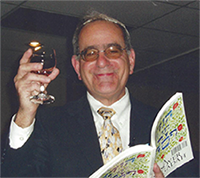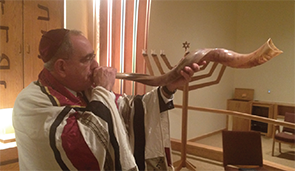
Dr. Block at the congregation’s annual Seder.
Sidney R. Block, MD, has practiced rheumatology in Maine since 1975, where he now lives on the coast in Northport. He has received the Paulding Phelps Award and been recognized as a Master by the American College of Rheumatology. He is also a lay cantor for the Jewish reform congregation in Bangor, which he helped found. As a cantor, Dr. Block leads services and prayers, and participates in weddings and funerals.
From Maryland to Maine
While growing up in Baltimore, Dr. Block received his religious education at a reform Jewish synagogue. That’s where he attended services, developed spiritual roots and where his Bar Mitzvah took place.
After graduating from Johns Hopkins Medical School in 1967, Dr. Block completed his medical training at the New York Hospital—Cornell Medical Center and the University of California San Francisco Medical Center. He then served in the Air Force for two years, stationed in Spokane, Wash., where he and his wife, Martha, became infatuated with the Pacific Northwest.
When Dr. Block was completing his rheumatology fellowship at the Hospital for Special Surgery in New York, he and his wife began searching for a new home in a community that shared the physical beauty of the Northwest. Because both of their families lived on the East Coast, their search focused on the Northeast and led them to Bangor, Maine.
One factor that influenced their decision to move was the presence of a Jewish community in Bangor that dated back to the mid-19th century and supported two synagogues, one orthodox and another conservative. However, Bangor did not have a reform synagogue, which represents the third major branch of Judaism, and better reflected Dr. Block’s religious training and background. That would later prove challenging.

Dr. Block, blowing the shofar.
After moving to Bangor in 1975, Dr. Block set up a private practice. Two years later, another rheumatologist, Dr. Geoffrey Gratwick, joined his practice. Dr. Gratwick would remain his partner for the next 37 years.
By 1980, Dr. Block and his wife had two children, Katherine and Benjamin, ages 4 and 5. Because there was no synagogue for reform Jews, they considered home schooling their children for their religious education. But that idea was far from appealing. Jews prefer to pray and learn as a community.
The Solution
Meanwhile, Dr. Block was aware of five other reform Jewish physicians in the community who were facing the same dilemma. He had an idea: Why shouldn’t they gather together to observe religious services, celebrate holidays and offer religious education to their children? Perhaps more local families would be interested in joining them.